西方文明史论文作业3
西方文明史论文

从宙斯到朱庇特——由希腊神话与罗马神话看罗马文明的兴衰(为什么古希腊人口中的宙斯,变成了古罗马人的朱庇特?为什么酒神狄奥尼索斯,到了罗马就变成了巴克斯?)古希腊文明和古罗马文明是欧洲文明的发源地,是西方文明的摇篮。
作为先后称霸地中海乃至亚非欧三洲的强大文明,古希腊文明与古罗马文明有着千丝万缕的联系。
对于这两大文明的研究直到今天也没有停止,今天我想从一个简单的方面来说说我对这段历史的理解。
首先,对古希腊与古罗马的历史简单介绍一下。
据资料记载,古希腊的历史,最早可以上溯到爱琴文化时期(约公元前3000年—约公元前1100年),但它最繁荣的时期是公元前5世纪至公元前4世纪中期,史称“古典时期”。
公元前146年,古希腊被罗马所灭亡。
古罗马的历史可以追溯到公元前8世纪—公元前6世纪的“伊达拉里亚时期”。
以后经历了“共和时期”(公元前509年—公元前30年)、“帝国时期”(公元前27年—公元476年),以“帝国时期”最为强盛。
两大文明在时间上几乎是承前启后,而在关系上两者却又因果纠缠。
诗人贺维斯曾说:“希腊人成了罗马人的俘虏,希腊文化俘虏了罗马人。
”古罗马人用武力击败希腊人一跃成为地中海霸主,然而古罗马的文化却几乎是完全传承与古希腊。
这一点无论是建筑、雕塑、哲学,都能看出端倪。
大部分文化成就,古罗马都是照搬古希腊人的。
这种文化上的照搬使罗马成为当时世界上最强大的国家之一,然而也使古罗马文明走向灭亡。
而我想从神话传说方面来对问题进行探讨。
古希腊文化中最为主要的部分就是对于神祗的崇拜,神话叙事几乎在每部希腊文学中都扮演了重要的角色,甚至形成了成系统的一套《神谱》(赫西俄德著)。
而以武力著称的罗马文明远远没有如此系统和繁荣的神话体系,所以在征服了希腊地区后,罗马人便将希腊神话纳入了自己的文化体系。
于是,希腊神话中的神王宙斯,在罗马文化中便成为了朱庇特;天后赫拉便成了朱诺、海神波塞冬成了尼普顿、酒神狄奥尼索斯变成了巴克斯……这种罗马文明对希腊文明的剽窃绝不仅仅是巧合,我们可以从很多方面来看待这种现象。
西方文化史课程结业论文【可编辑】

跨专业选修课《西方文化史》结课论文姓名:学号:院系:中西思想文化对其政治制度的影响思想文化是一种社会现象,是人们长期创造形成的产物,同时又是一种历史现象,是社会历史的积淀物。
我这里讲到的思想文化是狭义上的文化,指的是能够被传承的国家或民族的历史、地理、风土人情、传统习俗、生活方式、文学艺术、行为规范、思维方式、价值观念等。
在社会历史发展的进程中,西方国家为什么能在短时间内迅速从封建社会过渡到资本主义社会并确立资产阶级民主制度?中国几千年来专制制度为什么会如此根深蒂固,通往现代民主政治之路发展如此漫长?这是一个值得人们深入思考的问题。
我们可以看到,中西方在思想文化上具有明显的差异,同时与之对应的政治制度也有巨大的差异,这两者是否有一定的相关性呢?首先,我们从中西两种不同文明的社会历史方面来分析。
古代的中国,远在封建时代初期,国家权力集中在一家一姓之间,因此这使得氏族和血缘关系在政治上显得格外重要。
血缘关系的扩展,又使得宗法制得以产生,从此“公天下”彻底变成了“家天下”,这也就锁定了政治制度的发展方向:专制集权。
古代中国,由于封建制度的存在,贵族和皇帝只能是附属关系,受皇帝控制而无法做到相对独立,想搞独立的一律被定为“反贼”,并予消灭。
国家最高权力掌握在皇帝手中。
为了维护本民族的权利,必须消灭流失于外邦的利益,因而古代中国始终向往大一统的时代,认为这样才会有安全感,这种思想在无形中增添了封建君主专制制度存在的合法性。
“秦王扫六合,虎视何雄哉!”这种对促成国家统一力量的颂赞,在另一种程度上导致了人民对这种力量的盲目崇拜。
追求国家统一的这种民族历史心态,纵容了封建专制制度的长期存在。
另外,中国是一个农耕民族,自古以自然经济为主,这种经济具有相当程度的稳定性,因而也就具备了长期延续的基础。
中国古代自然经济具有不可避免的脆弱性,很多时候是“看天吃饭”,在自然的力量面前,人们变得柔弱而苟且,天子都不例外。
在荒年,天子往往会颁布“罪己诏”以求上天宽恕,就是个例子。
欧洲文化的论文(3)
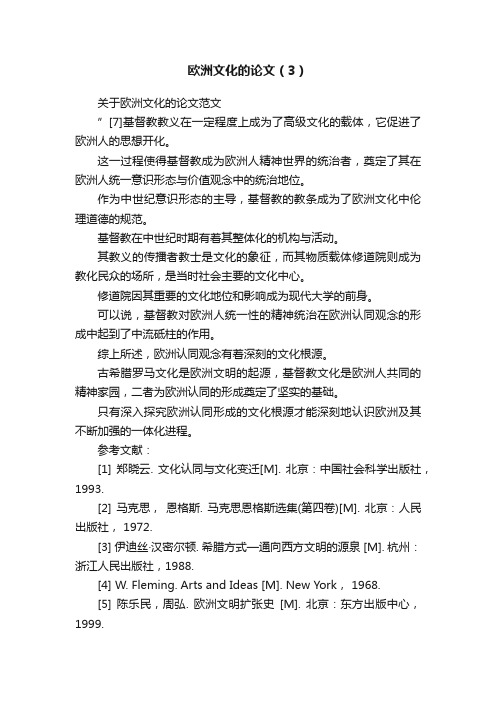
欧洲文化的论文(3)关于欧洲文化的论文范文”[7]基督教教义在一定程度上成为了高级文化的载体,它促进了欧洲人的思想开化。
这一过程使得基督教成为欧洲人精神世界的统治者,奠定了其在欧洲人统一意识形态与价值观念中的统治地位。
作为中世纪意识形态的主导,基督教的教条成为了欧洲文化中伦理道德的规范。
基督教在中世纪时期有着其整体化的机构与活动。
其教义的传播者教士是文化的象征,而其物质载体修道院则成为教化民众的场所,是当时社会主要的文化中心。
修道院因其重要的文化地位和影响成为现代大学的前身。
可以说,基督教对欧洲人统一性的精神统治在欧洲认同观念的形成中起到了中流砥柱的作用。
综上所述,欧洲认同观念有着深刻的文化根源。
古希腊罗马文化是欧洲文明的起源,基督教文化是欧洲人共同的精神家园,二者为欧洲认同的形成奠定了坚实的基础。
只有深入探究欧洲认同形成的文化根源才能深刻地认识欧洲及其不断加强的一体化进程。
参考文献:[1] 郑晓云. 文化认同与文化变迁[M]. 北京:中国社会科学出版社,1993.[2] 马克思,恩格斯. 马克思恩格斯选集(第四卷)[M]. 北京:人民出版社, 1972.[3] 伊迪丝·汉密尔顿. 希腊方式—通向西方文明的源泉 [M]. 杭州:浙江人民出版社,1988.[4] W. Fleming. Arts and Ideas [M]. New York, 1968.[5] 陈乐民,周弘. 欧洲文明扩张史[M]. 北京:东方出版中心,1999.[6] Anthony Pagden. The Idea of Europe [M]. Woodrow Wilson Center Press and Cambridge University Press. U.K. 2002.[7] 惠一鸣. 欧洲联盟发展史(上). 北京:中国社会科学出版社,2003年第1版.。
期末论文--西方文明史

浅谈罗马帝国衰落的原因一提起罗马,大家应该都不陌生,一个历史上强大的帝国,然而却也最终逃不过灭忙的下场,个中原因,众说纷纭。
而我在本学期选修了雷芳老师的西方文明史后,对于这一事件也有了一些自己的看法,便说说自己的浅见吧。
我个人认为一个国家的灭亡,无非是四个方面出现问题:政治,经济,军事和文化。
下面我就从这几个方面分析一下罗马帝国。
一,政治第一,罗马帝国时期,罗马的政治制度缺乏明确的继承法,因此后来出现很多继承上的矛盾,领导者换的频率是非常高的,这对于一个国家的稳定是非常不利的。
第二,中央集权的专制制度太严重,普通的公民缺少参与政治的机会,共和国下的公民变成了臣民,人们对国家漠不关心,也不再那么忠诚了。
第三,当时的贪污腐败问题也是相当严重,这加速了国家与普通民众的矛盾。
第四,赋税太过沉重,加重了人民的负担,让国家失去了更多的人民支持。
二,经济罗马的经济问题主要是由奴隶制度与劳动力短缺造成的。
第一,罗马帝国时期,城市里面的很多产品都是靠奴隶制造的,而伴随着罗马帝国版图的增大,战争停止了,也就俘获不了奴隶,奴隶的来源大大减少,劳动力开始不足。
第二,罗马帝国政治的腐败也带给经济更多的压力,比如贫富差距太大。
这也激化了不同阶级的矛盾。
三,军事第一,罗马人崇尚武力,喜欢到处征战。
在罗马帝国时期,罗马人的爱国心、荣誉感、民族精神、尚武精神,加上巨大经济利益的驱使和政治地位提高的诱惑,造就了罗马军队强大的战斗力。
但是,繁荣盛世也成为了腐败的温床,当罗马帝国没有敌人可以征服的时候,他们开始沉浸于安逸的生活,花天酒地的生活磨灭了罗马人的进取心,腐蚀了罗马军人的斗志。
第二,罗马强大的军事力量被用于个人目的。
尤其是在罗马帝国后期,腐败导致帝王对军队的倚重和骄宠,对军队的过分骄宠更加加剧了官兵的腐败,从而形成了一种恶性循环,这大大销蚀了罗马军队的战斗力。
帝国后期,许多帝王荒淫豪奢、腐化至极,贵族地主挥金如土,醉生梦死,致使民不聊生、政局动荡。
西方文明史论文

罗马帝国衰落的原因罗马帝国(前27年—395年),正式名称为元老院与罗马人民,是古罗马文明的一个阶段。
罗马的不断扩张使其成为一个帝国。
安东尼王朝皇帝图拉真(公元98年-117年)在位时,罗马帝国版图达到最大,经济空前繁荣,西起西班牙、不列颠,东到幼发拉底河上游、南自非洲北部,北达莱茵河与多瑙河一带,地中海成为帝国的内海,全盛时期控制了大约590万平方公里的土地,是世界古代史上最大的君主制国家之一。
395年,罗马帝国一分为二,实行永久分治。
西罗马帝国于476年灭亡,东罗马帝国于1453年灭亡。
偌大的一个强大的帝国是如何历经了分裂、灭亡的呢?狄奥多西一世在392年瓦伦提尼安二世被杀后,宣布基督教为国教,反对一切异教和异端。
狄奥多西一世在394年击败了西部的篡位者欧根尼乌斯后,成为了帝国的唯一统治者,这是罗马帝国的最后一次统一。
此年的罗马统治下的人口有3600万人。
395年狄奥多西去世,他把帝国一分为二,东部分给长子阿卡狄乌斯,西部分给幼子霍诺里乌斯。
东西罗马帝国分裂后,哥特人首领阿拉里克在东北亚游牧民族匈奴族人的强大压力下不断入侵罗马帝国。
而东西罗马帝国不是团结起来一致抗敌,而是坐视阿拉里克强大,希望他去攻击对方。
405年冬,阿拉里克和匈奴联军突破了罗马帝国的莱茵河防线,罗马并无有效的抵抗,实际上等于放弃了高卢的大部分地区。
407年,驻守不列颠的将领君士坦丁三世造反,西罗马帝国皇帝霍诺里乌斯企图使阿拉里克去攻击君士坦丁三世,阿拉里克要求4000磅黄金为代价。
随后,由于霍诺里乌斯先答应而后食言,阿拉里克和匈奴联军入侵意大利,霍诺里乌斯从米兰逃亡到拉韦纳。
阿拉里克南下,围困了罗马。
罗马城内爆发了饥荒和瘟疫,元老院和阿拉里克媾和,交出了5000磅黄金、30000磅白银一起其他许多贵重物品和财宝。
409年,阿拉里克和匈奴联军第二次包围罗马,扶立了一个傀儡皇帝,而龟缩在拉韦纳的霍诺里乌斯在东罗马帝国的支援下才保住皇位。
西方文明史论文

西方文明通论期末论文浅议中西古典园林艺术之3 差异陶煦芝 100212009037 09级文化产业管理浅议中西古典园林艺术之差异陶煦芝 100212009037 09级文化产业管理【摘要】中西方古典园林艺术在其漫长的历史发展中逐渐形成各自鲜明的风格特征,尤其在造园理念上大有不同。
本文主要从哲学思想、审美理想、艺术特点、设计思想等方面分析中西古典园林艺术的差异,并简要介绍两者之间的交流与相互影响。
这样能够更深理解中西古典园林艺术之美,也对其保护与发展有更多认识。
【关键字】中西古典园林艺术特征差异交流园林是一种文化,所以与东西方的其他文化一样,东西方园林艺术也具有各自的文化特征和风格。
【1】在东方是以苏州园林为代表的中国古典园林,在西方则是以凡尔赛宫园林为代表的法国古典园林。
它们都在东西方的园林中有着极为重要的地位,代表着各自文化艺术中的精华。
本文主要以他们为例来介绍中西方古典园林艺术之差异。
一.古典园林的起源与发展英国植物学家威尔逊称“中国是世界园林之母”。
中国是一个园林文化发展得最早、最完善的国家,同时它也是东方园林的主要代表。
中国古代园林有着漫长的发展史 ,从先秦到明清,历朝历代 ,各有成就 ,也各有特征 ,但总的说 ,是一个不断完善、提高的过程。
从《诗经》及《孟子》的记载可知,早在公元前11世纪周文王就筑灵台、灵沼、灵圃,这是最早的皇家园林雏形。
自此,中国古典园林经历了以下发展阶段:第一个时期是从周文王时代至东汉末年的萌芽期。
从早期供狩猎之用的“囿”发展到以园林为主的帝王苑囿行宫。
第二个时期是魏晋南北朝的形成期。
形成了以“崇尚自然”为理念、观赏游览为主的园林艺术。
第三个时期是隋唐宋的成熟期。
文人参与造园的活动把园林与诗、画相联系,形成了“唐宋写意山水园”的特色。
第四个时期是明清的全盛期。
建造了以大规模写意自然山水园及集各地名园胜景于一园为特点的皇家园林。
私家园林在造园艺术上达到了炉火纯青的境界。
西方文明史论文

《西方文明史》期末考查学院外语学院班_级_B1202__ 学号__0311120217__姓名_王颖__1、试分析新教各派的共同点(至少说出五点)(1)新教各派均独立自主,以耶稣为教会的最高领袖,否认罗马天主教圣传和教皇的权威,并与之断绝一切关系,均自信它自己才是真正的基督的继承者。
(2)废除教阶制,信徒与教牧人员在宗教上一律平等。
各派均不认为教士具有特别的、神圣的、超自然的性质,反对教士在中世纪所占有的地位,他们一般称教士为牧师,废弃了神职人员守独身的规定,这是新教教义对天主教教义法规的一个人性改革,他们没有修士、修女或托钵僧。
(3)他们都以方言(或国语)代替拉丁语为礼拜用语,均缩减圣礼,多是由七减为二,只强调洗礼和圣餐两种圣事,对圣餐礼均不接受变体论,亦多视为象征而非传递神的恩典的必要途径。
有些新教派别甚至放弃了所有圣事。
他们在一些惯例方面,不崇拜圣母、圣徒,念玫瑰经文和朝拜圣地等。
(4)他们均以《圣经》为基督信仰的唯一真源,均持天堂和地狱之间并无炼狱存在的认知,也均不承认赎罪券的价值。
《圣经》是信仰的准则,不承认天主教的圣传。
简而言之,推崇《圣经》权威为主旨。
(5)各派均有个人主义的色彩,多数派别都强调上帝的恩宠与主权、唯信得救即唯信称义、和教会是基督徒的团契,拯救是通过对耶稣基督的信仰而不是通过善功而获得,主张信心信仰的重要,以及读经解经的自由。
3、为什么说古希腊文明表现了极强的原创性和人文主义倾向?(1)吸收西亚和北非的古老文明成果,但进行了创造性发展;字母文字::希腊人在借鉴腓尼基字母的过程中对其进行了改进,并对字母进行了增减,最重要的是创新除了代表元音的字母,别于腓尼基的辅音字母体系,使得希腊文字在亚历山大东征之后成为世界性语言,也成为希腊文明的传承载体。
几何学:欧几里得创立了几何学,他的《几何原本》对当时一直的集合成就进行了系统整理,按照严密的演绎逻辑,建立了一个完整的几何学体系,成为西方几何学的标准教科书,被使用了两千多年,没有任何一部科学著作能有如此之长的生命力。
中外文明史论文
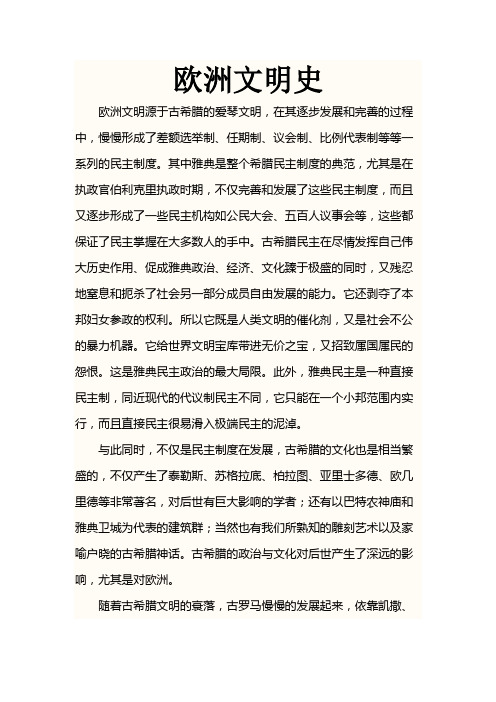
欧洲文明史欧洲文明源于古希腊的爱琴文明,在其逐步发展和完善的过程中,慢慢形成了差额选举制、任期制、议会制、比例代表制等等一系列的民主制度。
其中雅典是整个希腊民主制度的典范,尤其是在执政官伯利克里执政时期,不仅完善和发展了这些民主制度,而且又逐步形成了一些民主机构如公民大会、五百人议事会等,这些都保证了民主掌握在大多数人的手中。
古希腊民主在尽情发挥自己伟大历史作用、促成雅典政治、经济、文化臻于极盛的同时,又残忍地窒息和扼杀了社会另一部分成员自由发展的能力。
它还剥夺了本邦妇女参政的权利。
所以它既是人类文明的催化剂,又是社会不公的暴力机器。
它给世界文明宝库带进无价之宝,又招致属国属民的怨恨。
这是雅典民主政治的最大局限。
此外,雅典民主是一种直接民主制,同近现代的代议制民主不同,它只能在一个小邦范围内实行,而且直接民主很易滑入极端民主的泥淖。
与此同时,不仅是民主制度在发展,古希腊的文化也是相当繁盛的,不仅产生了泰勒斯、苏格拉底、柏拉图、亚里士多德、欧几里德等非常著名,对后世有巨大影响的学者;还有以巴特农神庙和雅典卫城为代表的建筑群;当然也有我们所熟知的雕刻艺术以及家喻户晓的古希腊神话。
古希腊的政治与文化对后世产生了深远的影响,尤其是对欧洲。
随着古希腊文明的衰落,古罗马慢慢的发展起来,依靠凯撒、庞培以及屋大维等人的东征西讨,逐步建立了一个环绕地中海的巨大帝国。
古罗马也有其特有的政治制度。
罗马法便是其中一项不朽的成就。
罗马法主要包括了《十二铜表法》和查士丁尼法典。
《十二铜表法》是古罗马第一部成文法典,是古罗马固有习惯法的汇编,它总结了前一阶段的习惯法,并为罗马法的发展奠定了基础,是“一切公法和私法的渊源”。
许多世纪以来,《十二铜表法》被认为是罗马法的主要渊源。
但它只是在一定限度内维护平民的利益,仍然保留了一些野蛮的习惯法。
它内容相当广泛,条纹比较清晰,标志着罗马成文法的诞生;审判、量刑皆有法可依,在一定程度上限制了贵族的特权与专横,保护了平民的利益;但也保留了一些比较野蛮的习俗。
自-西方文明史导论作业参考答案要点

《西方文明史导论》作业参考答案要点第一章绪论1、【问答题】(1分)英国前首相丘吉尔说:“大学不仅要传授知识,大学更应当传授智慧。
大学不应满足于培训技术,大学更应致力于锻造人格。
”结合你自己的专业,谈谈你对这段话的理解。
主观发挥题,无标准答案,言之有理、表述清晰有逻辑,能提出自己的观点认识为好。
第二章希腊文化的意境和希腊1、【问答题】(10分)概述希腊文化的意境。
理想与美:希腊艺术的意境表述;情感交流的方式:直觉、诗语和精神的形象化;玄同忘我之境在理想和现实的交汇点产生。
2、【问答题】(10分)阐述希腊文化的特点来自民间的自发的民族文化;心灵性,每一件艺术都是用心灵雕刻出的精品;向善性;唯美主义;神秘性和悬念第三章古代希腊的英雄主义1、【问答题】(10分)《荷马史诗》中的隐喻是什么?《荷马史诗》分成两部,上部《伊利亚特》,下部《奥德赛》。
两部史诗的内容不一样,前一部叫人拼命去当英雄,后一部叫人做一个平常人,游山玩水找到自己。
两个主题、风格、内容完全不一样的史书合在一起叫做《荷马史诗》,遭来很多人的非议。
一种普遍的说法是两部史书不是同一个人写的,因为它们的内容如此不同,所要反映的精神世界也是如此不同。
另一种说法,正是这样一种不同,反而组成一个合体,看到了它的两个面。
为什么这么一部有名的史诗,在主题和情节安排上产生出如此之大的反差?是作者的有意所为,还是一个历史的巧合?现在已无从考证,《荷马史诗》的原稿已经没有了。
姑且不做这样的文献考订,围绕内容来说,看一看这里面有没有被我们称之为大惑不解之谜,或者说是荷马史诗的隐喻,有什么谜语隐藏其中。
2、【问答题】(10分)如何破解《荷马史诗》的隐喻?隐喻的破解:英雄主义隐喻的破解:浪漫主义奥德修斯情结和圆满的结局:从英雄主义转变到浪漫主义;行动的浪漫主义者而不是精神的浪漫主义者;坚定的目标性,找回自己;找到两极之间的最佳点;最后的发现:人与人、家和家、社会和社会之间,是可以取得和谐的。
西方文明史论文

古罗马的交通发展古罗马一度成为当时最强盛的国家之一,这与它四通八达的交通是密不可分的,谚语“条条大路通罗马”流传至今也足以证明古罗马交通之发达。
古罗马的交通方式主要分为道路交通和海运两种。
在道路交通方面,由罗马城向四面八方辐射的道路,成为帝国交通的典型代表。
这些道路的路基主要由碎石、沙子和三合土铺成,在最上面铺上石块;由于意大利半岛上随处可见的石灰岩地形,使得路基的主要成分变得像混凝土,大道两旁设有排水用的水沟,使得道路经久耐用。
现在的法国、西班牙、意大利的部分地区都还在使用罗马时期修建的道路。
古罗马道路的宽度因道路的具体用途而有所不同。
重要性较低的道路可能只宽 1米左右,用于军事用途的大道则可达到4至6 米,而在道路与城门的接口处,为了方便人们通行,防止人口过多而引起交通堵塞,道路的宽度甚至可达 15 米。
在一些特殊的地段修路,古罗马也有突出的表现。
古罗马在造桥和开凿隧道上展现出高超的技术能力,如公元前3世纪,罗马人就掌握了拱券技术并迅速运用于桥梁建设中,此后桥梁的建造基本上采用石制结构,石拱桥被大量建造;在开凿隧道方面,古罗马有成套的钻探、挖坑、掘巷道、照明、通风、打桩、运送和测量的新方法,有研究者认为直到中世纪晚期的时候,世界上还没有国家能与之比肩。
虽然有较多的道路,但是从恺撒至康茂德,禁止有轮车辆在白天通行,人们只好步行,或乘坐奴隶抬行的轿子或担架。
较远的路程,人们则骑马和坐在马拉的驿车或四轮马车上。
乘坐驿马旅行车,平均每天可行60英里。
最初,一些罗马城市的街道相对狭窄,加上人口众多,道路拥堵的情况十分严重。
在之后的城市规划中,罗马吸取教训,更加重视城市生活各方面的需要。
在奥古斯都统治期间,罗马就建立起了帝国的邮递系统――驿站。
合理的驿站间距也充分表现出道路对自然环境和沿途人口及其发展情况的适应。
古罗马的海运也有十分繁荣。
据说古罗马拥有百余条商道供商船航行。
阿特纳奥斯所形容的一艘运粮船420英尺长,船上有一根57英尺长的船辐,这只是相当例外的一个。
西方文明史感悟英文作文
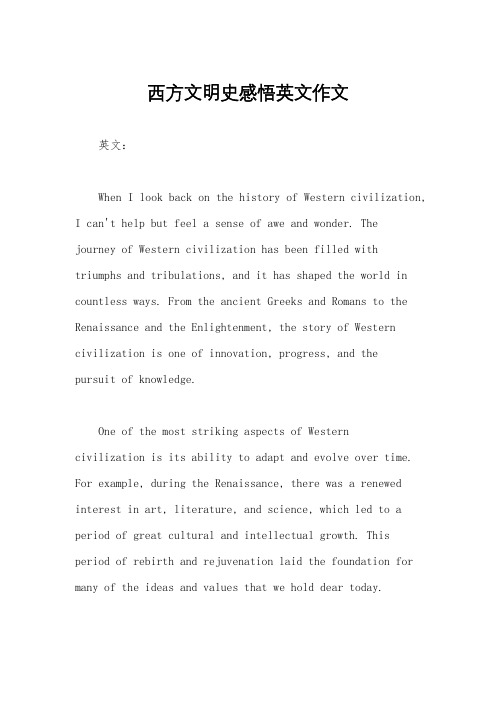
西方文明史感悟英文作文英文:When I look back on the history of Western civilization, I can't help but feel a sense of awe and wonder. Thejourney of Western civilization has been filled with triumphs and tribulations, and it has shaped the world in countless ways. From the ancient Greeks and Romans to the Renaissance and the Enlightenment, the story of Western civilization is one of innovation, progress, and thepursuit of knowledge.One of the most striking aspects of Westerncivilization is its ability to adapt and evolve over time. For example, during the Renaissance, there was a renewed interest in art, literature, and science, which led to a period of great cultural and intellectual growth. This period of rebirth and rejuvenation laid the foundation for many of the ideas and values that we hold dear today.Another key characteristic of Western civilization is its commitment to individualism and freedom. Throughout history, the Western world has been a beacon of liberty and democracy, championing the rights of the individual and the importance of personal autonomy. This commitment to individualism has led to the development of diverse and vibrant societies, where people are free to express themselves and pursue their own dreams and aspirations.However, it's also important to acknowledge the darker moments in the history of Western civilization. The legacy of colonialism, imperialism, and slavery has left a lasting impact on the world, and it's a reminder that progress often comes with a cost. It's crucial to confront and learn from the mistakes of the past in order to build a better future for all.In conclusion, the history of Western civilization is a complex tapestry of triumphs and challenges, and it continues to shape the world in profound ways. By embracing the lessons of the past and striving for a more just and equitable future, we can ensure that the legacy of Westerncivilization is one of progress and enlightenment.中文:当我回顾西方文明史时,我不禁感到敬畏和惊叹。
西方文明史论文
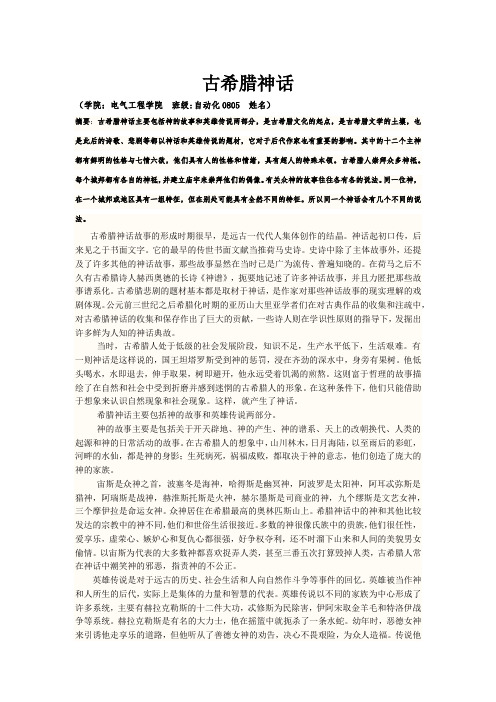
古希腊神话(学院:电气工程学院班级:自动化0805 姓名)摘要:古希腊神话主要包括神的故事和英雄传说两部分,是古希腊文化的起点,是古希腊文学的土壤,也是此后的诗歌、悲剧等都以神话和英雄传说的题材,它对于后代作家也有重要的影响。
其中的十二个主神都有鲜明的性格与七情六欲,他们具有人的性格和情绪,具有超人的特殊本领。
古希腊人崇拜众多神祗。
每个城邦都有各自的神祗,并建立庙宇来崇拜他们的偶像。
有关众神的故事往往各有各的说法。
同一位神,在一个城邦或地区具有一组特征,但在别处可能具有全然不同的特征。
所以同一个神话会有几个不同的说法。
古希腊神话故事的形成时期很早,是远古一代代人集体创作的结晶。
神话起初口传,后来见之于书面文字。
它的最早的传世书面文献当推荷马史诗。
史诗中除了主体故事外,还提及了许多其他的神话故事,那些故事显然在当时已是广为流传、普遍知晓的。
在荷马之后不久有古希腊诗人赫西奥德的长诗《神谱》,扼要地记述了许多神话故事,并且力匿把那些故事谱系化。
古希腊悲剧的题材基本都是取材于神话,是作家对那些神话故事的现实理解的戏剧体现。
公元前三世纪之后希腊化时期的亚历山大里亚学者们在对古典作品的收集和注疏中,对古希腊神话的收集和保存作出了巨大的贡献,一些诗人则在学识性原则的指导下,发掘出许多鲜为人知的神话典故。
当时,古希腊人处于低级的社会发展阶段,知识不足,生产水平低下,生活艰难。
有一则神话是这样说的,国王坦塔罗斯受到神的惩罚,浸在齐劲的深水中,身旁有果树。
他低头喝水,水即退去,伸手取果,树即避开,他永远受着饥渴的煎熬。
这则富于哲理的故事描绘了在自然和社会中受到折磨并感到迷惘的古希腊人的形象。
在这种条件下,他们只能借助于想象来认识自然现象和社会现象。
这样,就产生了神话。
希腊神话主要包括神的故事和英雄传说两部分。
神的故事主要是包括关于开天辟地、神的产生、神的谱系、天上的改朝换代、人类的起源和神的日常活动的故事。
在古希腊人的想象中,山川林木,日月海陆,以至雨后的彩虹,河畔的水仙,都是神的身影;生死病死,祸福成败,都取决于神的意志,他们创造了庞大的神的家族。
西方文明史论文
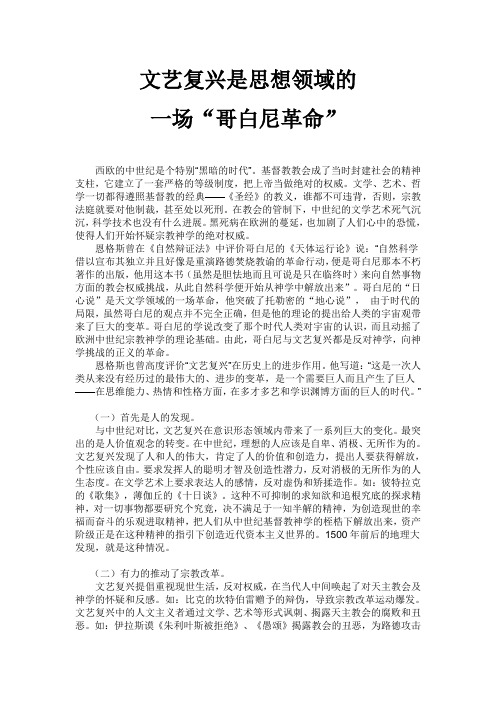
文艺复兴是思想领域的一场“哥白尼革命”西欧的中世纪是个特别“黑暗的时代”。
基督教教会成了当时封建社会的精神支柱,它建立了一套严格的等级制度,把上帝当做绝对的权威。
文学、艺术、哲学一切都得遵照基督教的经典——《圣经》的教义,谁都不可违背,否则,宗教法庭就要对他制裁,甚至处以死刑。
在教会的管制下,中世纪的文学艺术死气沉沉,科学技术也没有什么进展。
黑死病在欧洲的蔓延,也加剧了人们心中的恐慌,使得人们开始怀疑宗教神学的绝对权威。
恩格斯曾在《自然辩证法》中评价哥白尼的《天体运行论》说:“自然科学借以宣布其独立并且好像是重演路德焚烧教谕的革命行动,便是哥白尼那本不朽著作的出版,他用这本书(虽然是胆怯地而且可说是只在临终时)来向自然事物方面的教会权威挑战,从此自然科学便开始从神学中解放出来”。
哥白尼的“日心说”是天文学领域的一场革命,他突破了托勒密的“地心说”,由于时代的局限,虽然哥白尼的观点并不完全正确,但是他的理论的提出给人类的宇宙观带来了巨大的变革。
哥白尼的学说改变了那个时代人类对宇宙的认识,而且动摇了欧洲中世纪宗教神学的理论基础。
由此,哥白尼与文艺复兴都是反对神学,向神学挑战的正义的革命。
恩格斯也曾高度评价“文艺复兴”在历史上的进步作用。
他写道:“这是一次人类从来没有经历过的最伟大的、进步的变革,是一个需要巨人而且产生了巨人——在思维能力、热情和性格方面,在多才多艺和学识渊博方面的巨人的时代。
”(一)首先是人的发现。
与中世纪对比,文艺复兴在意识形态领域内带来了一系列巨大的变化。
最突出的是人价值观念的转变。
在中世纪,理想的人应该是自卑、消极、无所作为的。
文艺复兴发现了人和人的伟大,肯定了人的价值和创造力,提出人要获得解放,个性应该自由。
要求发挥人的聪明才智及创造性潜力,反对消极的无所作为的人生态度。
在文学艺术上要求表达人的感情,反对虚伪和矫揉造作。
如:彼特拉克的《歌集》,薄伽丘的《十日谈》。
这种不可抑制的求知欲和追根究底的探求精神,对一切事物都要研究个究竟,决不满足于一知半解的精神,为创造现世的幸福而奋斗的乐观进取精神,把人们从中世纪基督教神学的桎梏下解放出来,资产阶级正是在这种精神的指引下创造近代资本主义世界的。
西方文明史论文作业
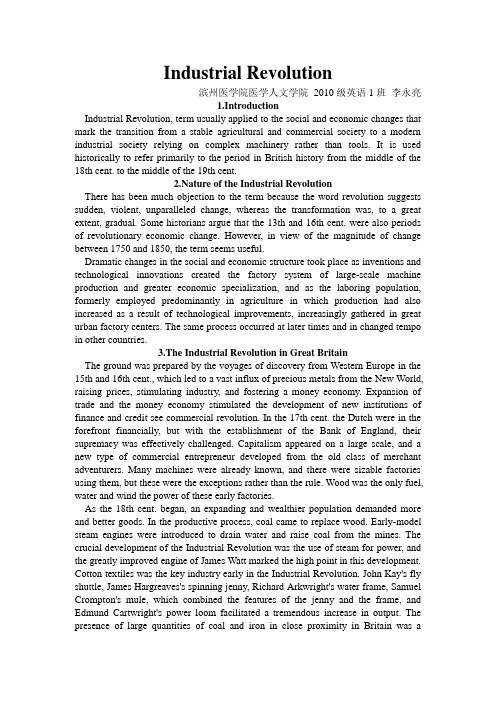
Industrial Revolution滨州医学院医学人文学院2010级英语1班李永亮1.IntroductionIndustrial Revolution, term usually applied to the social and economic changes that mark the transition from a stable agricultural and commercial society to a modern industrial society relying on complex machinery rather than tools. It is used historically to refer primarily to the period in British history from the middle of the 18th cent. to the middle of the 19th cent.2.Nature of the Industrial RevolutionThere has been much objection to the term because the word revolution suggests sudden, violent, unparalleled change, whereas the transformation was, to a great extent, gradual. Some historians argue that the 13th and 16th cent. were also periods of revolutionary economic change. However, in view of the magnitude of change between 1750 and 1850, the term seems useful.Dramatic changes in the social and economic structure took place as inventions and technological innovations created the factory system of large-scale machine production and greater economic specialization, and as the laboring population, formerly employed predominantly in agriculture in which production had also increased as a result of technological improvements, increasingly gathered in great urban factory centers. The same process occurred at later times and in changed tempo in other countries.3.The Industrial Revolution in Great BritainThe ground was prepared by the voyages of discovery from Western Europe in the 15th and 16th cent., which led to a vast influx of precious metals from the New World, raising prices, stimulating industry, and fostering a money economy. Expansion of trade and the money economy stimulated the development of new institutions of finance and credit see commercial revolution. In the 17th cent. the Dutch were in the forefront financially, but with the establishment of the Bank of England, their supremacy was effectively challenged. Capitalism appeared on a large scale, and a new type of commercial entrepreneur developed from the old class of merchant adventurers. Many machines were already known, and there were sizable factories using them, but these were the exceptions rather than the rule. Wood was the only fuel, water and wind the power of these early factories.As the 18th cent. began, an expanding and wealthier population demanded more and better goods. In the productive process, coal came to replace wood. Early-model steam engines were introduced to drain water and raise coal from the mines. The crucial development of the Industrial Revolution was the use of steam for power, and the greatly improved engine of James Watt marked the high point in this development. Cotton textiles was the key industry early in the Industrial Revolution. John Kay's fly shuttle, James Hargreaves's spinning jenny, Richard Arkwright's water frame, Samuel Crompton's mule, which combined the features of the jenny and the frame, and Edmund Cartwright's power loom facilitated a tremendous increase in output. The presence of large quantities of coal and iron in close proximity in Britain was adecisive factor in its rapid industrial growth.The use of coke in iron production had far-reaching effects. The coal mines from the early 1700s had become paramount in importance, and the Black Country appeared in England at the same time that Lancashire and Yorkshire were being transformed into the greatest textile centers of the world. Factories and industrial towns sprang up. Canals and roads were built, and the advent of the railroad and the steamship widened the market for manufactured goods. The Bessemer process made a gigantic contribution, for it was largely responsible for the extension of the use of steam and steel that were the two chief features of industry in the middle of the 19th cent. Chemical innovations and, most important of all, perhaps, machines for making machines played an important part in the vast changes.The Industrial Revolution did not in fact end in Britain in the mid-1800s. New periods came in with electricity and the gasoline engine. By 1850, however, the transformation wrought by the revolution was accomplished, in that industry had become a dominant factor in the nation's life.4.The Worldwide RevolutionFrance had in the 17th and most of the 18th cent. kept pace with Britain, but it later lagged behind in industrial development, and the British victory in their long-standing commercial rivalry kept markets away from France. The revolution did not make the rapid progress that it did in Britain, but after 1830 it developed steadily. The railroad and improved transportation preceded the introduction of the revolution into Germany, which is conventionally said to have accompanied the formation of the Zollverein; industrial Germany was created after 1850.The United States made some contributions to the early revolution, notably the cotton gin of Eli Whitney. But the transformation of the United States into an industrial nation took place largely after the Civil War and on the British model. The textile mills of New England had long been in existence, but the boom period of industrial organization was from 1860 to 1890. The Industrial Revolution was introduced by Europeans into Asia, and the last years of the 19th and the early years of the 20th cent. saw the development of industries in India, China, and Japan. However, Japan is the only country of E Asia that may be said to have had a real Industrial Revolution. The Russian Revolution had as a basic aim the introduction of industrialism.5.Its EffectsThe Industrial Revolution has changed the face of nations, giving rise to urban centers requiring vast municipal services. It created a specialized and interdependent economic life and made the urban worker more completely dependent on the will of the employer than the rural worker had been. Relations between capital and labor were aggravated, and Marxism was one product of this unrest. Doctrines of laissez-faire, developed in the writings of Adam Smith and David Ricardo, sought to maximize the use of new productive facilities. But the revolution also brought a need for a new type of state intervention to protect the laborer and to provide necessary services. Laissez faire gradually gave way in the United States, Britain, and elsewhere to welfare capitalism. The economic theories of John Maynard Keynes reflected thischange. The Industrial Revolution also provided the economic base for the rise of the professions, population expansion, and improvement in living standards and remains a primary goal of less developed nations.。
我眼中的西方文明史(西方文明史论文)

我眼中的西方文明史(西方文明史论文)西方文明史期末作业Written by XHNWestern civilization in my eyes After learning this lesson for one term,I know a lot about western in many fields such as mythology、philosophy、festival and communication. How can I describe the western civilization? I think it’s one part full of amazing、wisdom、freedom and convert during the synchronous development of the western world.We have learnt several mythologies and I find that the “god” in western mythology is not a serious image, opposite, ZeuS, gods’ leader, always does m any self-willed things which sounds uncomfortable. Just because of it, the “god” makes people feel real and vivid. Not as our country, western people may prefer to believe gods is more similar to normal people, I think, at the least in emotion part.How about philosophy? We also know many philosopher from our country like Lao Tz and Chuang Tse, they usually spread their idea by teach others and write some book. But in ancient Greece, there are three famous philosopher called Socrates、Plato and Aristotle. They prefer to communicate with others than teach others what they think about. I think if we defined that Chinese philosophy likes teaching, then, western philosophy may likes debating. I should admit that the academic atmosphere in that time in western was good, I still remember there are a paint named “the school of Athens”, painted by Raphael, describe how crowd during the school, it reflect that at that time there are many people have huge thirst of knowledge, they have some topic such as “what made the world”、“what’s the resourceof the world”…… In a word, the philosophy in western civilization usually make me associate freedom and holy, it’s one thing tha t you are willing to devote your whole life to learn.There is one well known book called “the Bible”, many festivals are come into being from this book, like Christmas and Easter Day, two festival which used to commemorate the born and revive of Jesus. Different from our country, most of the western festival is closely related with religion, we can see that the belief is too important for western people.As for communicate, I think it’s more affected by political system, freedom and open atmosphere full of the whole western world so that people can express personal opinion without any hesitate. I think it’s a good society custom and will do well for one country’s development.In my eyes, the western civilization is one thing that we would appreciate rather than study it. The civilization show us a glorious thing which created by human, we should know not only our country have broad and profound culture, but also the western world have, so we should learn from each other in mutual emulation.。
“西方文明史”期末论文

“西方文明史”期末考查期末采用大作业形式进行考查,分两部分:I. 这学期你选修这门课的主要收获;II.在以下题目中,任选一题写一篇短论:1,为什么许多西方人心怀“古希腊情结”?2,为什么说美是古希腊文化的最高理想?3,中世纪是黑暗时代吗?4,试就古希腊艺术与中世纪艺术做一对比,并分析导致其不同面貌的原因。
5,文艺复兴为什么可以说是思想文化领域内的一场“哥白尼革命”?6,如何理解法国哲学家笛卡尔提出的“I think, therefore I am”?7,谈谈你对自由的理解。
8,你如何评价启蒙理性的得失?如何看待文明发展中利弊相参的吊诡现象?9,西方历史上有许多神学家从各种不同角度来论证上帝的存在,但尼采在《苏鲁支语录》中说上帝死了,上帝唯一可以原谅的地方是,他并不存在。
试论尼采这一思想对现代西方文化的影响。
10,试论现代性与传统的对立。
11,试论现代性与大众文化的对立。
12,结合某一具体文学艺术作品谈谈你对现代派艺术的感受。
13,何为大众文化?你对它持何种态度?14,有学者认为,现在的问题已不是西方文明能否继续存在下去,而是是否应该继续生存下去。
他们是在什么背景下做出此类置疑的?你认为他们是否有吹毛求疵之嫌?15,你认为不同文化是样式的不同还是等级的高低?为什么?16,试从文化多元论出发,对哈佛大学教授亨廷顿的文明冲突论做一评论。
17,谈谈宽容在构建和谐的人际关系乃至处理不同文明关系中的作用。
【注意】1,期末作业占学期总分的70%,平时的到课率及课堂答问、讨论占30%。
2,作业应包括以上一、二两个部分。
各部分的篇幅,自己分配比例。
3,两部分总字数不能少于2,000字,也不要超过3,500字。
请尽量简洁明了,字数超出太多将给成绩带来不利影响。
4,两部分的区别:第二部分个人色彩较少,论述时应做到有理有据。
第一部分不怕写得没有系统,可以仅仅是一种最直接的感受、印象,也可以是体会、启发、疑问、意见、建议等等,还可以评说对哪些部分感兴趣,哪些内容听不懂。
世界文明史论文作业

人类文明专题作业问题一简要阐述西方文明(以西方文明的源与流作为主要线索回答)1、西方文明的源包含宗教的源以和科学的源首先是宗教的源——希伯来文明(基督教文明)。
希伯来文明诞生于巴勒斯坦,在古代这块地方被称为迦南。
希伯来人是犹太人的祖先。
不过,在古代世界中,政治上希伯来人扮演了相对不太重要的角色,它的文明也没有埃及文明和美索不达米亚文明那么显赫。
然而,约在公元前1200至400年间,希伯来人创立了一种宗教――犹太教,犹太教对于早期的基督教和伊斯兰教的形成,有着重大影响。
人们把希伯来文明作为西欧文明的来源之一。
直至今日犹太人仍在世界各地起着重要的作用,犹太人问题仍是世界事务中的一个重要问题。
因此,希伯来人具有异乎寻常的历史重要性。
古代希伯来宗教思想的发展,大致经历过四个阶段:第一个阶段可以称为前摩西阶段,大致在希伯来民族最初兴起的时候。
这个阶段的特点起初是万物有灵论,崇拜寓于树木、山峦、圣井、圣泉甚至奇岩怪石的精灵。
形形色色的巫术也是盛行在这个时期,如向古魂问卜、摹拟巫术、替罪羊献祭等等。
很多早期的信仰和做法留下的痕迹在《旧约全书》中仍可看到。
每个神通常都是一般地称为“厄勒”即“神”。
他们分别是某个特定地方或者可能是某个特定部落的守护神。
这个时期还没有全民族的耶和华崇拜。
耶和华自称“亚伯拉罕的神”。
第二阶段从公元前12世纪至8世纪中叶,称之为全民族单拜一神教阶段。
希伯来人渐渐地把一个神作为全民族的神祗,神的名字似可写作“Jhwh”或“Yhwh”。
在希伯来人那里读作“雅赫维”,后来希腊学者将它读成了Yahweh (耶和华)。
在摩西时期及其后二、三个世纪,耶和华是个有点特别的神。
几乎只有他被想象为具有人的属性。
“上帝”这个尊号耶和华几乎不能与之相称,因为他的权力仅仅限于希伯来人自己居住的地区。
正是在这一时期,希伯来人逐渐相信上帝并非内在于自然,而是外在于自然,而人类作为自然的一部分,通过神意成为自然的主宰。
西方文明史导论作业
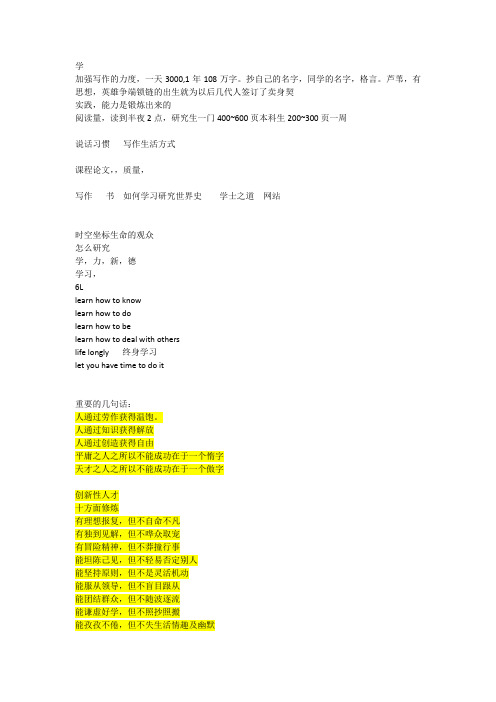
学加强写作的力度,一天3000,1年108万字。
抄自己的名字,同学的名字,格言。
芦苇,有思想,英雄争端锁链的出生就为以后几代人签订了卖身契实践,能力是锻炼出来的阅读量,读到半夜2点,研究生一门400~600页本科生200~300页一周说话习惯写作生活方式课程论文,,质量,写作书如何学习研究世界史学士之道网站时空坐标生命的观众怎么研究学,力,新,德学习,6Llearn how to knowlearn how to dolearn how to belearn how to deal with otherslife longly终身学习let you have time to do it重要的几句话:人通过劳作获得温饱。
人通过知识获得解放人通过创造获得自由平庸之人之所以不能成功在于一个惰字天才之人之所以不能成功在于一个傲字创新性人才十方面修炼有理想报复,但不自命不凡有独到见解,但不哗众取宠有冒险精神,但不莽撞行事能坦陈己见,但不轻易否定别人能坚持原则,但不是灵活机动能服从领导,但不盲目跟从能团结群众,但不随波逐流能谦虚好学,但不照抄照搬能孜孜不倦,但不失生活情趣及幽默能充分展现个人魅力,但绝不损害别人的形象第一章大学不仅要传授知识,更应当传授智慧。
大学不应满足培训技术,大学更应该致力于锻造人格。
我的专业是信息与计算科学,数学与计算机结合的专业。
单一的知识并不能让我们走多远,因为目前的知识有限,解决问题所总结的知识毕竟少数,不一定都有现成的方法解决所遇到的问题。
但是别人解决问题时的智慧是可以学习的,这样才有更大的作为。
我觉得在大学很有必要去锻炼自己的思想,并不能只局限于知识,因为知识是死的,就在那里,人的智慧让知识焕发新的活力,所以智慧显得尤为重要。
换句话说,知识可以很容易地被扩充,但是智慧并不是那么容易得到的。
我觉得智慧源于思想,思想源于对知识的理解和总结,有明显的个人理解的印记。
如今知识海量,人与人之间不能简单地比较知识的多少,但是智慧更有竞争力。
西方文化小论文作业-古希腊哲学Ancient Greek Philisophy

Ancient Greek PhilosophyAncient Greek is the cradle of western civilization, and Greek’s philosophy is also profound and well-known to the world. There three brilliant philosophers having been crowned with eternal glory: Socrates, Plato and Aristotle.SocratesSocrateswas a classical Greek philosopher credited as one of the founders of Western philosophy. His student Plato once said that Socrates was the first people who brought philosophy down from the heavens, placed it in cities, introduced it into families, and obliged it to examine into life and morals, good and evil.Socrates, through his whole life, were devoted to spread knowledge and wisdom, and he never stopped pursuing truth.He once said“I know that I know nothing”. Besides, he believed that no one desires evil and people’s virtueis knowledge. If one seek for happiness, he or she must had great virtue. The great happiness is truth and ignorance is evil.Socrates is one of the greatest men in Ancient Greek because his endless pursuit and faith of truth. A work Phaedo related to Socrates recorded his words: “You go to live, I'm going to die,which is better, only God knows.”Socrates was very poor through his worldly life, but he never cared. Socrates has forsaken materialenjoyment and his thought and wisdom are loyal.When Socrates was penalized to death, he was extremely calm and even discuss philosophy with his students. It’s so difficult to be completely indifferent in the face of death, so we can know how lofty his world is.。
西方文化史作文

《新生》中的人文主义精神启蒙运动丰富和发展了文艺复兴时期的人文主义精神内涵,把反封建、反宗教神学的斗争推进到反对封建专制制度、建立资产阶级“理性王国”、按照资产阶级利益建构政治制度的高度,从而比文艺复兴时期的人文主义更为彻底,更具鲜明的政治革命性质。
这一思想解放运动不仅为资产阶级革命做了舆论准备,而且为人类社会创造了宝贵的精神财富。
阿利盖利·但丁(1265—1321)。
13世纪末,意大利文艺复兴的前夜佛罗伦萨诞生了位伟大的男性诗人。
意大利诗人,现代意大利语的奠基者,欧洲文艺复兴时代的开拓人物之一,以长诗《神曲》留名后世。
他被认为是意大利最伟大的诗人,也是西方最杰出的诗人之一,全世界最伟大的作家之一。
恩格斯评价说:“封建的中世纪的终结和现代资本主义纪元的开端,是以一位大人物为标志的,这位人物就是意大利人但丁,他是中世纪的最后一位诗人,同时又是新时代的最初一位诗人。
”但丁生于佛罗伦萨一个城市贵族之家,其父因家道中落,长期经商。
当时该城有代表封建贵族利益、支持罗马教皇的基白林党和支持神圣罗马帝国皇帝、代表资产阶级利益的贵尔夫党。
但丁的父亲自然拥戴贵尔夫党,而但丁本人后来则成为该党的领袖之一。
但丁有过一次刻骨铭心的爱情,在其文学创作中留下了不可磨灭的烙印。
那是在他的少年时代,他随父参加友人聚会,遇上一位名叫贝阿特丽切的少女。
少女的端庄、贞淑与优雅的气质令但丁对她一见钟情,再不能忘。
遗憾的是贝阿特丽切后来遵从父命嫁予他人,婚后数年竟因病夭亡。
哀伤不已的但丁将自己几年来陆续写给贝阿特丽切的三十一首抒情诗以散文相连缀,取名《新生》(1292—1293)结集出版。
诗中抒发了诗人对少女深挚的感情,纯真的爱恋和绵绵无尽的思念,风格清新自然,细腻委婉。
爱的方式有很多种,但丁的爱是柏拉图式的。
他们就见过3次面,仅此而已。
但是,贝尔特丽采的形象却深深镌刻在但丁的心里。
她在他心中犹如教徒心目中的圣母玛利亚,成了真、善、美的化身。
- 1、下载文档前请自行甄别文档内容的完整性,平台不提供额外的编辑、内容补充、找答案等附加服务。
- 2、"仅部分预览"的文档,不可在线预览部分如存在完整性等问题,可反馈申请退款(可完整预览的文档不适用该条件!)。
- 3、如文档侵犯您的权益,请联系客服反馈,我们会尽快为您处理(人工客服工作时间:9:00-18:30)。
The Attraction of Greek Mythology希腊神话的魅力Abstract:Greek mythology is the body of myths and legends belonging to the ancient Greeksconcerning their gods and heroes, the nature of the world, and the origins and significance of their own cult and ritual practices. They were a part of religion in ancient Greece. Greek mythology is embodied, explicitly, in a large collection of narratives, and implicitly in Greek representational arts, such as vase-paintings and votive gifts. Greek myth attempts to explain the origins of the world, and details the lives and adventures of a wide variety of gods, goddesses, heroes, heroines, and mythological creatures. These accounts initially were disseminated in an oral-poetic tradition; today the Greek myths are known primarily from Greek literature.Key words:Greek myths; Greek legends; ancient Greeks; originⅠ.IntroductionSince I was 12-year-old around, I have been fascinated by western mythology especially Greek mythology, because it stands for a part of Western culture, in some degree. The origin of the word “mythology” is from a Greekword“mythos+logos”,“mythos”means“word”or“verbal language”,“logos”means“story”. It reflects nature and society of ancient people and it is an original understanding of human beings about origin of world, natural phenomenon and social livelihood. So I think it is necessary to research into Greek mythology further.Ⅱ.Sources of Greek mythologyThere are various versions of sources of Greek mythology. Literary sourcesand archaeological sources are two main sources. As for literary sources, Homer played asignificant role who is well-known by eminent epic poems Iliad and Odyssey which are the oldest known literary sources. What’s more, the only general mythographical handbook to survive from Greek antiquity was the Library of Pseudo-Apollodorus. Greek mythology is known today primarily from Greek literature and representations on visual media dating from the Geometric period from c. 900–800 BC onward. Mythical narration plays an important role in nearly every genre of Greek literature. And Greek lyric poets including Pindar, Bacchylides, Simonides and bucolic poets such as Theocritus and Bion, relate individual mythological incidents. On another aspect, according to archaeo- logical sources, Heinrich Schliemann (the German amateur archaeologist, in the nineteenth century), Sir Arthur Evans (British archaeologist, in the twentieth century) contributed a lot to the discovery about resources. And the discovery of many Greek myths attested on vases which were found earlier than literary text works numerosity. More sources are waiting to be observed and studied.Ⅲ. Greek pantheonA. The system of GodsIn Greek myth,“gods are plentiful and systemic, just like a complete world of human beings”(Switch 16).The gods all possess the capabilities of supermen, and have fairly low moral standards, even lower than that of worldly people.“Greek myth, as the spoken literatu re in the early period of human society, represents abundant themes of human nature, presenting the passionate side of Greek spirit”(Green 4).B. Greek pantheonAccording to Classical-era mythology, after the overthrow of the Titans, the new pantheon of gods and goddesses was confirmed. Among the principal Greek gods were the Olympians, residing atop Mount Olympus under the eye of Zeus. Zeus was the king of the gods. He was the ruler of the heavens where he controlled the weather and the skies. He created thunder and could hurl lightning bolts at those who angered him. The thunderbolts were given to Zeus by a Cyclops to help aid him in his war against the Titans Zeus was married six times, and he had numerous affairs with goddesses and mortal women alike.Hera was the queen of heaven and married to Zeus. Though she was the protector of marriage, she had little success in limiting Zeus’s affairs. She is often portrayed as an angry and jealous wife of Zeus a nd his many lovers. Hera seemed to direct her anger at Zeus’s lovers, instead of Zeus, even though most of the ladies tried to escape his advances. Zeus has a great amount of sons and daughters, they’re all gods, goddesses or half-gods.C. Age of gods and mortalsBridging the age when gods lived alone and the age when divine interference in human affairs was limited was a transitional age in which gods and mortals moved together. These were the early days of the world when the groups mingled more freely than they did later. Most of these tales were later told by Ovid's Metamorphosesand they are often divided into two thematic groups: tales of love, and tales of punishment. For instance, Prometheus’s stealing fire from the gods, in the Homeric Hymn to Aphrodite, where the goddess’s lying with Anchises to produce Aeneas and so on are very familiar to us.Ⅳ. ConclusionGreek mythology has exerted an extensive influence on the culture, the arts, and the literature of Western civilization and remains part of Western heritage and language. Poets and artists from ancient times to the present have derived inspiration from Greek mythology and have discovered contemporary significance and relevance in these mythological themes. Greek mythology has its unique attraction including its literary, art, construction, religion, etc. But the very magic thing is its uncountable stories in my point of view. Every moment I read them, I will feel the admiration of ancient Greeks to their gods. And I will obtain more western culture after I study Greek mythology.Works CitedWikipedia. /wiki/Main_PageAnonymous. The Comparison Between Chinese Myth and Greek Myth.。
